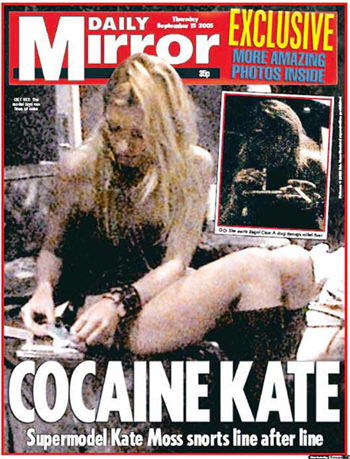
Today the branding industry is in constant warfare mode. Marketing strategies are given utmost importance in the industry if a brand has to walk ahead of its cut throat competition. Millions of pounds are spent on advertising campaigns and promotional strategies. For example, some fashion designers hold sample sales to promote their new collection to draw in crowds to their stores. Some brands offer free products on purchase of their product and almost everyone has a fashion show or huge celebrity endorsed parties. One of the most important strategies behind advertising is putting your image as close to the consumer's face as possible. When he is walking on a street, or travelling in the tube, or sitting and relaxing with a coffee in a shop, your hoarding your advert should be the most prominent thing in front of their eyes. I don't blame brands. After all customer is the king and to please the king you have to think of ways to constantly be in their eye. That is one way to make a customer move towards climbing the ladder of loyalty to the brand.
But the question is, is everything justified in brand wars. Can marketing strategies be more important than customer benefit, if in fact marketing is done for customer benefit? Topshop entered into a deal with Kate Moss in 2007 to launch a collection targeted at teenagers. From then on it has been rumored that she received more than 1 million a year for her collections and the brand made around 40 million with the sales. Financial gain smells sweetly of success, but do brands not have an ethical responsibility towards the consumers. The deal which is still on and its marketed at a high rate does not realize the negative effect it can have on teenagers. Celebrities are role models for the younger generation. They tend not to follow into their fashion style but also want to imitate their lifestyle and habits. Things that they say and do are regarded as 'cool.' Maybe even drug or alcohol addiction?
In 2005 an article in the Daily Mirror exposed Kate Moss as a drug addict. It stated " The skeletal model's coke-fueled plunge from grace has exposed some ugly truths about the fashion industry -- not least its world-class hypocrisy.Two weeks ago, during New York City's Fashion Week, London's Daily Mirror newspaper splashed its cover with an image of Moss -- still a supermodel at 31, as well as mother to a 2-year-old daughter -- cutting lines of cocaine on a CD jewel box." Being a global fashion icon and a role model for young girls and women around the world, does such a reckless attitude justify her to be used as a brand ambassador? Is it then ethical for brands to have a celebrity deal even when she is in the news for all the wrong reasons. Are brands that hungry for public attention?
The brands she was working for at that time such as Chanel, Rimmel, fired her for sometime but then rehired her again. Is the value of a pretty face then more important than their habits?
 Paris Hilton endorsed the brand Guess, whilst being in the news for sex scandal videos and alcohol addiction issues. This should have been a cue for brands to take their hands off her, but the list of endorsements and advertisements continued.
Paris Hilton endorsed the brand Guess, whilst being in the news for sex scandal videos and alcohol addiction issues. This should have been a cue for brands to take their hands off her, but the list of endorsements and advertisements continued.Lindsay Lohan was signed on by Fornarina, an Italian denim brand in 2009 despite reports of her reckless behaviour and addiction to cocaine. Her family issues with her father made headlines and her parent's divorce was considered a cause for the addiction. Lindsay Lohan continued despite various efforts to join a rehabilitation centre.
Celebrities do add a great sense of value to a brand's image and help bring in customers. As everything that happens in a celebrities life is exciting and adventurous as much as following their style. But is everything fair in love and brand wars? Ethically is it right for a brand to do this or even this is something we are ready to forget about? Since in the 21st century, everything seems possible and excusable.
Ciao

No comments:
Post a Comment
Note: only a member of this blog may post a comment.